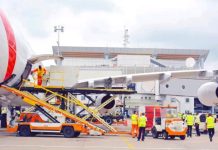A trustee of the Airline Operators of Nigeria (AON), Mr. Roland Iyayi, has urged the Federal Government to urgently review the newly imposed $300 helicopter landing fee, describing it as a policy that lacks proper industry consultation and poses a threat to aviation growth.
Speaking with journalists in Lagos on Thursday, Mr. Iyayi — who is also the President of Topbrass Aviation Ltd — criticised the fee being collected by NAEBI Dynamic Concept Ltd on behalf of the Federal Government, with the support of the Nigerian Airspace Management Agency (NAMA). The charge applies to helicopter landings across Nigerian airports and helipads.
“This same issue was raised under former Aviation Minister Hadi Sirika, and we shut it down because the industry was already overburdened with taxes,” Iyayi told the News Agency of Nigeria (NAN). “Reintroducing a $300 fee on every helicopter landing is not only harmful but unjustifiable. It adds no value to the system and lacks both legislative and regulatory backing.”
Iyayi noted that helicopter operators have consistently complied with tax regulations and argued that imposing an additional landing fee—particularly on helicopters serving the oil and gas sector—amounts to double taxation.
“These helicopters don’t use government terminals. They land at facilities owned by the oil companies themselves. Why should a private operator pay the government for landing at a client-owned terminal?” he asked.
He questioned the legitimacy of NAEBI Dynamic Concept Ltd, stating that the firm offers no infrastructure or service of its own, yet leverages NAMA’s infrastructure to collect the $300 per landing charge.
Iyayi further raised concerns about aviation-generated revenue not being reinvested into the sector. “Revenue from aviation should remain within aviation. But with current tax laws, these funds go straight to the Nigerian Revenue Service (NRS), with little or nothing coming back into the industry. This hurts infrastructure development,” he said.
The aviation expert also highlighted the absurdity of the policy given that many of the oil and gas operations are structured as joint ventures in which the government, through the Nigerian National Petroleum Company Limited (NNPCL), often owns up to 60% equity.
“In reality, the government ends up taxing itself. That’s inefficient. These extra costs may cause oil firms to cancel contracts just to stay within budget, and it’s helicopter operators that will suffer the most,” he warned.
Iyayi said that NAMA had initially directed oil firms—not operators—to pay the landing fee, but regardless of who bears the cost, the policy creates unnecessary complications and inefficiencies.
He stressed that any such financial imposition must pass through due process. “NAMA cannot arbitrarily introduce new charges. There must be National Assembly approval and regulatory concurrence. Otherwise, it amounts to an illegal levy,” he said.
Iyayi concluded by condemning the lack of impact assessment before the charge was enforced, warning that “there are too many things that don’t add up in this policy. We need reforms that support the aviation sector, not more burdens.”













